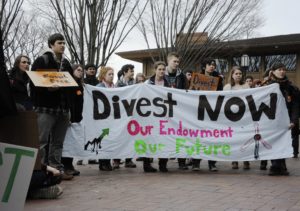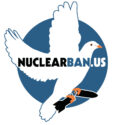
US students are leading successful divestment campaigns against the fossil fuel industry at universities across the country.
For this week’s blog, we’ve decided to focus on one of the key strategies behind the campaign to get the US to sign on to the Nuclear Ban Treaty – divestment. Divestment, simply put, means the opposite of investment, and occurs when individuals, institutions, businesses, and governments get rid of all their financial ties to particular corporations, institutions, or entities that are involved in unethical or morally reprehensible activities.
Divestment has quickly become a key strategy for activists and social movements working to put pressure on powerful corporations and reluctant governments to address various social or environmental justice issues. As citizens living in a global capitalist system where money equates to power, determining with whom and how we spend money is an important tool for creating change.
In the 1980s, widespread divestment campaigns were widely credited with helping end apartheid in South Africa, by raising awareness and eventually pressuring the US and other states to impose sanctions on South Africa. Major cities, universities, and corporations like IBM and General Motors divested from South Africa – in the process educating people on the brutality of apartheid and highlighting the US’s relative apathy on the issue. While the economic impacts of divestment campaigns are often minimal– for instance, in South Africa divestiture did not significantly impact the country’s economy – they are nonetheless important tools in the social movement arsenal that help educate and stigmatize particular activities of corporations, institutions, and governments that would otherwise go unnoticed.
Our convoluted economic web means that our institutions – colleges, businesses, banks, faith centers, and local governments are often directly and indirectly invested in an array of socially and environmentally unjust activities. Divestment campaigns promote the important work of holding institutions accountable to their values and bringing awareness and concern for these issues to the public gaze.
Nationwide divestment campaigns against tobacco companies in the 1990s highlighted the industry’s efforts to hide the health impacts of smoking and contributed to the passage of a host of new policies and regulations on the tobacco industry. Over the past few decades thriving divestment campaigns against the fossil fuel industry, the Israeli occupation of Palestine, the gun industry, the prison industry, and many others have taken root across the globe. The cornerstone of divestment’s power is not just the successful removal of funds from the targeted industry, institution, or state – but the process of mobilizing and educating people. Over time, this leads to a shift in public consciousness and the stigmatization of institutional and corporate ambivalence.
The Treaty Compliance Campaign embraces divestment as a vital tool for ensuring that the US eventually signs, ratifies and enforces the Nuclear Ban Treaty. We believe that if individuals, schools, faith organizations, businesses, and ultimately cities and states become treaty compliant by divesting from the 26 corporations currently making nuclear weapons and also commit to not purchase their products until they stop producing nuclear weapons, that we can ultimately pressure them to invest instead in other more socially acceptable activities. By alerting the companies of the reasons for our divestment and mobilizing our communities to also become treaty compliant, we can build a critical mass of people demanding corporations get out of the nuclear weapons industry.
When the education systems, local governments, businesses, and faith centers that are the backbone of our society start saying no to nuclear weapons – it is just a matter of time before the federal government follows suit. Check out our website or contact us to figure out how you and your community can divest from nuclear weapons.






